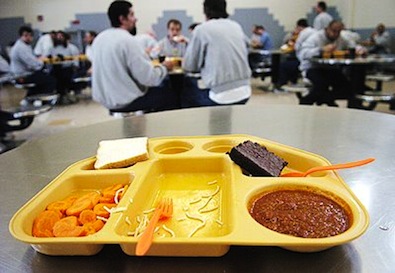Kosher Meals in Michigan Prisons
From the Detroit Jewish News
A proposed settlement reached Oct. 12 grants Michigan’s Jewish prisoners the ability to have Kosher meals.
Jewish inmates in Michigan prisons will start receiving kosher meals under a proposed settlement reached Oct. 12 in a class-action lawsuit handled by the Civil Rights Clinic at Michigan State University, led by Professor Daniel Manville. “We got the entry for preliminary approval and the notices will begin going up in the 16 Michigan prisons that house Jewish inmates,” Manville said.
Manville, an ex-offender who spent four years in prison in the 1970s, is an advocate for prisoners’ rights who likes to take on cases “that make an impact,” he says. He’s been working on this case since 2013.

“It stemmed from a lawsuit by Muslim prisoners who wanted a halal diet,” he explains. “The Michigan Department of Corrections (MDOC) agreed to provide those prisoners with a vegan diet to settle the claim. They then extended that vegan diet to Jewish prisoners who wanted kosher meals — kind of a one-size-fits-all religious meal solution.”
Former prisoner Michael Arnold filed suit after that decision because, he said, a vegan diet lacks kosher meat and dairy and, most importantly, doesn’t adhere to kosher principles of preparation, such as proscriptions against contamination with non-kosher utensils and prep areas. Arnold, who told the Detroit Free Press, “The policy of enforced vegetarianism was targeted” at Jewish prisoners, was dropped from the suit when he was released from prison.
Arnold’s original lawsuit eventually became “Gerald Ackerman and Mark Shaykin v. Heidi Washington,” the suit that was just settled, which resolves prisoners’ claims to kosher meals.
Currently, inmates have the option of purchasing kosher meals and products at the prison commissary twice a month, but, Manville says, the cost is prohibitive for most inmates. “Each meal costs around $5-$6, which is hard to afford when you’re earning $30 a month in your prison job and need to buy shampoo and other incidentals.”
Under the proposed settlement, which is subject to a fairness hearing Dec. 11 in front of U.S. District Judge Linda Parker in Detroit, Jewish inmates who keep kosher will be entitled to meals prepared in a certified kosher kitchen within the facility or certified kosher meals from a third-party vendor. Facilities that produce kosher meals onsite must submit to inspections to maintain kosher certification.
MDOC has cited the cost of creating kosher kitchens at $100,000 for each of the 16 facilities holding Jewish prisoners, or $1.6 million. “Which seems a little high,” Manville said.
According to MDOC, there are about 600 Jewish prisoners in Michigan’s 33,000 prison population. Of those 600, Manville said, between 85 and 193 are approved for kosher meals. “The discrepancy in the numbers likely stems from the 2013 settlement that forced those requesting kosher meals to eat the vegan meals,” Manville said. “Many Jewish prisoners dropped their requests for kosher and opted for the general menu.”
Prisoners not already approved for kosher meals can become eligible for kosher meals by living kosher for 60 days, which means that prisoners must use only the religious diet line for meals and may not “purchase, receive, possess or consume” any non-kosher item from the commissary, visitors or another prisoner. If at any time they are found to have consumed something non-kosher they have to restart the 60-day process.
“That provision was added to the settlement to ensure Michigan didn’t have 32,000 prisoners decide they were Jewish once they read the notice,” Manville said.
The settlement does not resolve plaintiffs’ meat and dairy consumption claims, Manville adds. The issue of whether Jewish prisoners will receive kosher meat and dairy meals 56 days a year (each Shabbat, Rosh Hashanah, Yom Kippur, Sukkot and Shavuot) is still in dispute and was just litigated early this month, “although all parties have agreed to at least one cheesecake per year,” Manville said. “We expect a ruling on that early next year.”
Manville said MDOC has claimed in court that it is reluctant to provide meat and dairy meals to kosher-observant prisoners 56 times a year because of the cost, which, according to Manville, would add $10,000-$20,000 per year in expenses for MDOC.
